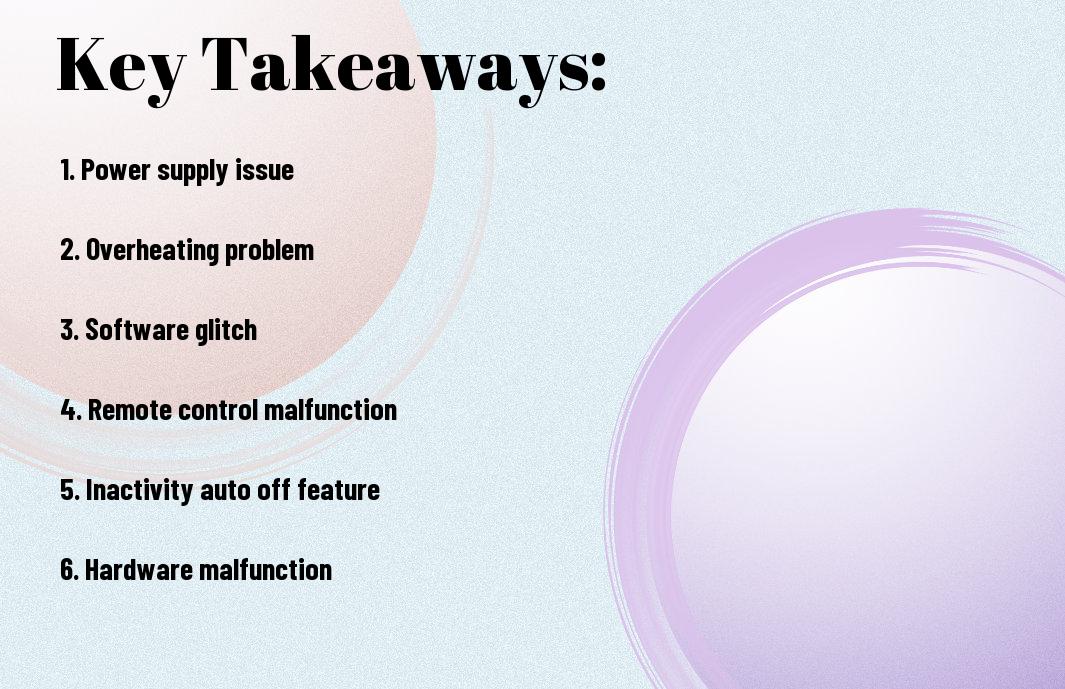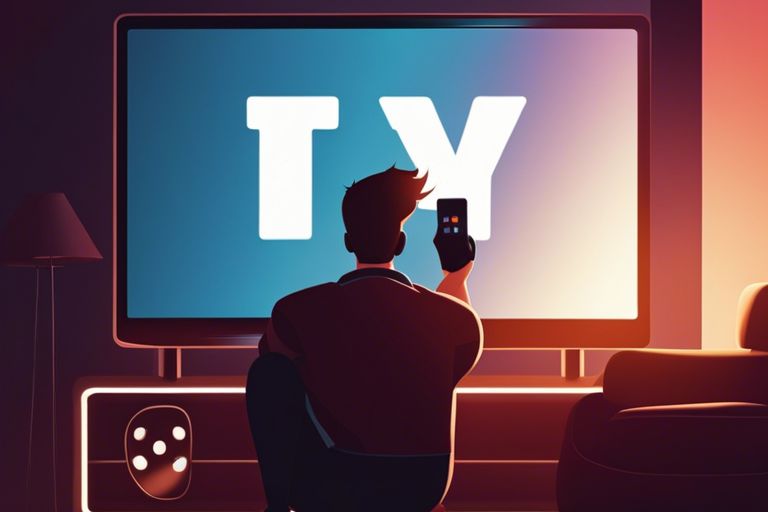It’s frustrating when your Hisense TV keeps turning off unexpectedly, disrupting your viewing experience. In this informative guide, we will explore common reasons why your TV might be shutting down on its own and provide troubleshooting steps to help you resolve the issue. By the end of this article, you will have a better understanding of what could be causing this problem and how to fix it, so you can enjoy uninterrupted entertainment on your Hisense TV. Let’s dive in!
Key Takeaways:
- Check power source: Ensure that the power cord is securely connected and the outlet is working properly.
- Software issues: Update the TV’s firmware or reset the TV to factory settings to resolve any software glitches causing the shutdowns.
- Overheating: Ensure that the TV is well-ventilated and not overheating, as this could be a reason for the frequent shutdowns.

Possible Causes of the Issue
While experiencing issues with your Hisense TV constantly turning off, various factors could be at play. Understanding the potential causes can help you troubleshoot and resolve the problem efficiently.
Power Supply Problems
Problems with the power supply can often be the culprit behind your Hisense TV turning off unexpectedly. Issues such as loose connections, power surges, or a faulty power supply unit can cause the TV to shut down intermittently.
Faulty Capacitors or Components
Problems with faulty capacitors or other internal components can also lead to your Hisense TV turning off by itself. Over time, capacitors can degrade or malfunction, causing power disruptions and leading to the TV shutting down unexpectedly. It’s crucial to have these components checked and replaced if necessary to ensure the proper functioning of your TV.
Power issues are a common cause of TVs turning off unexpectedly. If you suspect that faulty capacitors or components may be the issue, it’s best to consult a professional technician to diagnose and fix the problem effectively.
Troubleshooting Steps
Checking the Power Cord and Outlet
For the first step in troubleshooting why your Hisense TV keeps turning off, you should check the power cord and outlet. Make sure the power cord is securely plugged into both the TV and the power outlet. Inspect the cord for any visible damage or fraying that could be causing a poor connection.
Ensuring Proper Ventilation
For ensuring your Hisense TV functions correctly, proper ventilation is necessary. Ensure that there is enough space around the TV for air to circulate. Avoid placing the TV in a cramped space or blocking any ventilation slots on the back of the TV. Overheating can cause your TV to shut off unexpectedly, so proper ventilation is crucial.
The ventilation slots on the back of your Hisense TV allow heat to escape from the device. Blocking these vents with objects or placing the TV in a confined space can lead to overheating and automatic shut-off as a safety measure to prevent damage to the TV’s components.

Overheating Issues
Many electronic devices, including TVs, are susceptible to overheating if not properly ventilated. Overheating can lead to your Hisense TV shutting off unexpectedly, disrupting your viewing experience. To address this issue, it’s crucial to understand the signs of overheating and how to prevent it.
Signs of Overheating
With overheating, your Hisense TV may exhibit various signs that indicate a potential problem. Look out for your TV becoming unusually hot to the touch, frequent shutdowns, or displaying on-screen warnings about temperature. If you notice any of these signs, it’s important to take action to prevent further damage to your TV.
Cleaning the TV’s Vents and Fans
One effective way to prevent overheating in your Hisense TV is by regularly cleaning the vents and fans. Dust and debris can accumulate over time, obstructing airflow and causing the TV to overheat. By carefully cleaning these components, you can ensure that your TV receives proper ventilation and stays cool during operation.
It is recommended to use a soft brush or compressed air to gently remove any dust or dirt from the vents and fans. Make sure to power off your TV and unplug it before cleaning to avoid any accidents. Additionally, consider placing your Hisense TV in a well-ventilated area to promote airflow and prevent overheating issues in the future.
Firmware and Software Updates
Checking for Updates
Your Hisense TV may keep turning off due to outdated firmware or software. To ensure your TV is running the latest version, you need to regularly check for updates. Start by navigating to the Settings menu on your Hisense TV. Look for the ‘System’ or ‘About’ option, where you can find the current firmware and software version.
Updating the TV’s Firmware
For optimal performance and to address any issues like unexpected shutdowns, it’s necessary to keep your Hisense TV’s firmware up to date. Check the Hisense website or contact customer support to see if there are any available updates for your TV model. Follow the instructions provided to download and install the latest firmware onto your TV.
Updates not only enhance the functionality of your TV but also typically include bug fixes and security patches that can help prevent problems like frequent shutdowns. By staying on top of firmware and software updates, you can ensure a smoother and more stable viewing experience on your Hisense TV.
Loose Connections and Cables
Inspecting HDMI and Other Cables
For effective troubleshooting of your Hisense TV that keeps turning off, start by checking all the cables connected to your television. A loose HDMI or power cable can sometimes be the culprit behind the shutdowns. Carefully inspect each cable to ensure they are securely plugged into their respective ports.
Securing Loose Connections
On the back of your Hisense TV, you will find various input and output ports where cables are connected. Check each connection point for any looseness or poor attachment. Firmly push in each cable to ensure a snug fit. Loose connections can disrupt the power supply and cause your TV to shut down unexpectedly.
This simple check can prevent intermittent power issues and keep your Hisense TV running smoothly. Ensure all connections are secure before proceeding with other troubleshooting steps.
Power Management Settings
Adjusting the TV’s Power Saving Features
Noticing your Hisense TV frequently shutting off unexpectedly can be frustrating. You can address this issue by adjusting the power saving features on your TV. With just a few simple tweaks in the settings, you can potentially resolve the problem of your TV turning off by itself.
Disabling Automatic Shut-Off
Management of your TV’s power settings is crucial in preventing the automatic shut-off. If you find your Hisense TV keeps turning off on its own, it may be due to the automatic shut-off feature enabled in the settings. By disabling this feature, you can ensure that your TV stays on without interruptions.
Disabling the automatic shut-off feature on your Hisense TV can be a game-changer in maintaining a continuous viewing experience. This setting typically turns off the TV after a period of inactivity, but if it’s causing inconvenience for you, it’s worth exploring the settings menu to make the necessary adjustments and turn off this function.
Electrical Interference
Once again, electrical interference could be the culprit behind your Hisense TV turning off unexpectedly. When electronic devices emit signals that disrupt the power supply to your TV, it may cause it to shut down intermittently. Identifying the sources of interference is the first step in resolving this issue.
Identifying Sources of Interference
With so many electronic devices in our homes today, pinpointing the exact source of interference can be a challenge. Common culprits include cordless phones, microwave ovens, wireless routers, and even fluorescent lights. Start by turning off one device at a time to see if it stops your TV from turning off. This process of elimination can help you identify the problematic device.
Moving Devices Away from the TV
On the other hand, if you notice that certain devices seem to trigger the TV to turn off, consider moving them farther away from your television set. Physical distance can help reduce the impact of electromagnetic interference on your TV’s power supply. Make sure to create some space between these devices and your TV to see if it improves the situation.
Sources of interference can vary from household to household, so it’s imperative to experiment with relocating devices and observe the impact on your TV’s performance. By taking these steps, you can potentially mitigate electrical interference and prevent your Hisense TV from turning off unexpectedly.
TV Settings and Configurations
Despite your best efforts, your Hisense TV still keeps turning off unexpectedly. One possible reason could be conflicting settings within your TV’s menu. Let’s probe your TV settings and configurations to troubleshoot this issue.
Checking for Conflicting Settings
Conflicting settings within your Hisense TV can cause it to shut down on its own. Start by going through the different menus on your TV and pay close attention to any conflicting settings. For example, if you have both a sleep timer and a power-saving mode enabled, they might be working against each other, resulting in your TV turning off unexpectedly. Make sure all settings are aligned and serving the same purpose to prevent conflicts.
Resetting the TV to Factory Defaults
Settings that have been misconfigured or altered unknowingly can also be the culprit behind your Hisense TV’s random shutdowns. By resetting your TV to its factory defaults, you can revert all settings back to their original state. This can help eliminate any conflicting configurations that might be causing the issue. However, keep in mind that this will erase any personalized settings or preferences you’ve set on your TV.
This process varies depending on the make and model of your Hisense TV. Refer to your user manual for specific instructions on how to reset your TV to factory defaults. Remember to note down any custom settings you may want to reconfigure after the reset.
Hardware Issues
After ruling out software problems, you may want to consider hardware issues that could be causing your Hisense TV to keep turning off unexpectedly. One common hardware issue could be a faulty motherboard or components within the TV.
Faulty Motherboard or Components
Motherboard issues can often manifest as random shutdowns or problems with power regulation. If the motherboard on your Hisense TV is defective, it may not be able to supply a consistent power source to keep the TV running smoothly. Components such as capacitors or voltage regulators on the motherboard can also fail over time, leading to intermittent power issues.
Replacing Defective Parts
It’s important to note that troubleshooting and replacing defective parts on a TV should be done by a professional or someone with experience working with electronics. Attempting to repair or replace parts on your own can be dangerous and may further damage your TV. If you suspect that the motherboard or other components are at fault, it’s best to consult a certified technician who can diagnose the issue accurately and replace any faulty parts with new ones.

Environmental Factors
To address why your Hisense TV keeps turning off, you need to consider environmental factors that might be influencing its behavior. Various aspects of your surroundings can impact the performance of your TV, leading to unexpected shutdowns. Let’s research into the influence of environmental factors on your device.
Extreme Temperatures
The temperature around your Hisense TV can play a crucial role in its operation. Extreme temperatures, whether too hot or too cold, can cause your TV to shut down unexpectedly. Here’s a breakdown of how temperature affects your TV:
| Too Hot | Too Cold |
| High temperatures can cause overheating, leading to automatic shutdowns to prevent damage. | Extremely cold temperatures can slow down the TV’s internal processes, causing it to turn off spontaneously. |
Assume that your Hisense TV is placed near a fireplace or a heating vent, the excess heat can trigger automatic shutdowns to prevent overheating and potential damage to the internal components.
Humidity and Moisture
Environmental humidity levels can also impact the performance of your Hisense TV. Excessive moisture in the air can lead to electrical malfunctions and unexpected shutdowns. Here’s how humidity and moisture affect your device:
With high humidity levels, moisture can penetrate the TV’s internal circuitry, causing short circuits and sporadic shutdowns. Ensure your TV is placed in a well-ventilated area to minimize the effects of humidity on its operation.
Power Outages and Surges
Protecting the TV from Power Fluctuations
Keep your Hisense TV safe from power fluctuations by taking some preventive measures. One way to do this is by ensuring a stable power supply to your TV. Frequent power outages or surges can damage the delicate electronic components of your TV and cause it to turn off unexpectedly. Consider installing a voltage regulator or an uninterruptible power supply (UPS) to regulate the power supply to your TV and protect it from sudden voltage spikes.
Using a Surge Protector
Surge protectors are vital devices designed to safeguard your electronics from sudden power surges and spikes. By using a surge protector, you can add an extra layer of protection to your Hisense TV. Surge protectors work by diverting excess voltage away from your devices, ensuring they receive a steady and safe amount of power. Investing in a high-quality surge protector is a smart choice to keep your TV safe from potential damage caused by electrical fluctuations.
For instance, when lightning strikes or there is a sudden power surge in your home, a surge protector can absorb the excess electricity and prevent it from reaching your TV. This added protection can significantly extend the lifespan of your Hisense TV and prevent it from turning off unexpectedly due to electrical issues.
Age and Wear and Tear
Unlike a fine wine, your Hisense TV doesn’t necessarily get better with age. Over time, the components within your TV can show signs of wear and tear, causing it to malfunction or shut off unexpectedly. Understanding these signs can help you identify if age and wear and tear are the culprits behind your TV turning off.
Signs of Aging Components
On your Hisense TV, signs of aging components may include flickering screens, distorted images, or color inconsistencies. These issues can be caused by aging circuitry, deteriorating capacitors, or failing backlighting systems. If you notice any of these signs, it may be time to consider whether age-related issues are causing your TV to turn off.
Considering TV Replacement
The lifespan of a Hisense TV can vary depending on usage and maintenance. If your TV is consistently turning off due to age-related issues, it may be worth considering a replacement. Newer models offer improved technology, better energy efficiency, and enhanced features that can enhance your viewing experience. Plus, a new TV can eliminate the frustrations of dealing with an aging TV that keeps turning off unexpectedly.
Considering investing in a new Hisense TV can provide you with a reliable and up-to-date entertainment solution. When shopping for a replacement, look for models that suit your needs and provide the latest features to enjoy a seamless viewing experience.
Additional Troubleshooting Methods
Consulting the User Manual
Consulting the user manual can often provide valuable insights into troubleshooting your Hisense TV. It may contain specific instructions on common issues like why your TV keeps turning off unexpectedly. Refer to the troubleshooting section of the manual for step-by-step guidance on resolving the issue. Additionally, you can check for any recommended settings or updates that could help prevent the TV from shutting down on its own.
Contacting Hisense Support
For more complex issues or if you have followed all the troubleshooting steps without success, contacting Hisense Support may be necessary. Hisense customer support can provide you with personalized assistance and guide you through more advanced troubleshooting procedures over the phone or online. They may also be able to schedule an appointment for a technician to inspect your TV if the problem persists.
With the expertise of Hisense Support, you can rest assured that your issue will be handled professionally and efficiently. Don’t hesitate to reach out to them for assistance in resolving the recurring problem of your Hisense TV turning off unexpectedly.
Conclusion
Presently, you have gained valuable insights into why your Hisense TV keeps turning off unexpectedly. By understanding common issues such as power settings, software glitches, and overheating problems, you are better equipped to troubleshoot and resolve these issues on your own. Remember to check your power source, update your software, and ensure proper ventilation for your TV to function optimally. By following these simple steps, you can enjoy uninterrupted viewing experiences on your Hisense TV once again.
FAQ
Q: Why does my Hisense TV keep turning off?
A: There could be several reasons for this issue, such as a faulty power supply, overheating, a software glitch, or a remote control problem.
Q: How can I troubleshoot my Hisense TV that keeps turning off?
A: You can start by checking the power source, ensuring proper ventilation for the TV, updating the software, and checking the remote control batteries.
Q: What should I do if my Hisense TV keeps turning off randomly?
A: If the issue persists, you may need to contact Hisense customer support for further assistance or consider getting professional help to diagnose and fix the problem.
Q: Is there a way to prevent my Hisense TV from turning off automatically?
A: You can try adjusting the settings on the TV to disable any automatic power-saving features or timers that may be causing the TV to turn off unexpectedly.
Q: Can a faulty power outlet be the reason for my Hisense TV turning off frequently?
A: Yes, a faulty power outlet or power strip can cause power interruptions that may result in the TV turning off on its own. Try plugging the TV into a different outlet to see if the issue persists.
